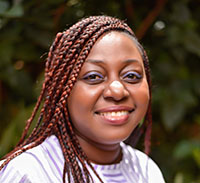
The climate crisis is a critical issue in the Democratic Republic of the Congo (DRC). The country hosts more than half of the Congo Basin’s forests and has impressive biodiversity that provides ecosystem services that are essential for ecological balance in the Congo basin, Africa, and the planet. DRC’s forest cover, however, is strongly impacted by deforestation and climate change.
Following the UN climate change conference (COP27) in Egypt, ongoing consultations among stakeholders (political decision makers, scientists, and civil society organizations) remain an important factor to translate global debates into national realities. In this context, the Center for International Forestry Research and World Agroforestry (CIFOR-ICRAF) and the University of Kinshasa (UNIKIN) organized a three-days scientific conference aimed at bridging policy and science to address climate change and deforestation in the DRC. The conference brought together scientists, policymakers, and a wide range of civil society representatives to discuss the way ahead, taking into consideration their different perspectives.
In her opening speech, UNIKIN’s rector’s representative Rose Gato said that “today more than ever, humanity has become aware of the importance of the environment in the maintenance of public health and well-being. The One Health approach proves that a multidisciplinary perspective offers adequate solutions to the major challenges of our society. Hence, this symposium organized by CIFOR and UNIKIN is timely, with an innovative theme.”
This message was echoed by Richard Eba’a Atyi, CIFOR-ICRAF’s Regional Coordinator for Central Africa. He also emphasized the importance of informed policies in addressing the challenges of our time. “We are aware that a small organization like ours, acting at the landscape level, is not enough to impact development,” he said. “That’s why we’re also moving towards policy impact, because policies can have more resonance at national, regional, and even international levels.”
CIFOR-ICRAF and UNIKIN’s approach in DRC seeks synergy between actions for an efficient fight against climate change, with a particular focus on deforestation. Dr. Denis Sonwa, a CIFOR-ICRAF senior scientist conducting research in the country, said at the closing ceremony that “the objective [of this event] was to bring together a number of actors – policymakers, scientists, Indigenous groups, donors, and students – to reflect on policies and progress, discuss the contribution of science to evidence-based decision-making, and share knowledge among stakeholders for better management of climate issues and deforestation.” He said the event, and the space it created for collaborative reflection, has “made it possible to disseminate new information on science, to share methodologies, and to show how science must be multidisciplinary to be able to answer questions.”
“Everyone continues to be attentive to the different agendas regarding forest conservation, sustainable management of natural resources, and local development.”
The REDD+ process (a United Nations-backed framework that aims to curb climate change by stopping the destruction of forests and deforestation) was also at the centre of discussions. Assani Ongala, the National Coordinator of the CN-REDD/DRC, presented the 10 measures taken by the government to advance the climate agenda. He noted that “the objective of the DRC’s engagement in the REDD+ process is twofold: to reduce greenhouse gas emissions caused by deforestation and forest degradation and to improve the living conditions of local communities. The REDD+ mechanism is the starting point for the DRC’s transition towards a green economy.” Ongala emphasized the importance of turning these 10 measures into reality to advance the climate agenda in the DRC – particularly in light of the fact that the DRC is currently attempting to advance the scheme’s implementation by signing a second letter of intent with the Central African Forests Initiative (CAFI), submitting its second set of Nationally Determined Contributions to the Paris Agreement on Climate Change (NDCs), and undertaking reforms to align the forestry sector with climate change policies. However, challenges for successful REDD+ implementation remain – and should be considered as the process advances.
Apart from scientific findings and methodologies, the conference was also enriched by critical themes such as social inequality, climate equity, and the importance of an adapted legal framework to support actions and activities deployed in-country. Patrice Bigombe, a researcher at the University of Yaoundé II, said that climate equity was “essential in the fight against climate change.” To tackle the issue effectively, he suggested creating a legal framework that involves deepening environmental and social safeguards.
The event concluded with an overarching call to action, launched by Dr. Denis Sonwa, that “everyone continues to be attentive to the different agendas regarding forest conservation, sustainable management of natural resources, and local development.” His remark underlines that while working to restore and preserve nature, we also need to bring sustainable development to this region and its communities.
CIFOR-ICRAF’s Global Comparative Study on REDD+ is funded by the Norwegian Agency for Development Cooperation (Norad), the International Climate Initiative (IKI) of the German Federal Ministry for the Environment, Nature Conservation and Nuclear Safety (BMU), the United States Agency for International Development (USAID) and the CGIAR Research Program on Forests, Trees and Agroforestry (CRP-FTA).
We want you to share Forests News content, which is licensed under Creative Commons Attribution-NonCommercial-ShareAlike 4.0 International (CC BY-NC-SA 4.0). This means you are free to redistribute our material for non-commercial purposes. All we ask is that you give Forests News appropriate credit and link to the original Forests News content, indicate if changes were made, and distribute your contributions under the same Creative Commons license. You must notify Forests News if you repost, reprint or reuse our materials by contacting forestsnews@cifor-icraf.org.














